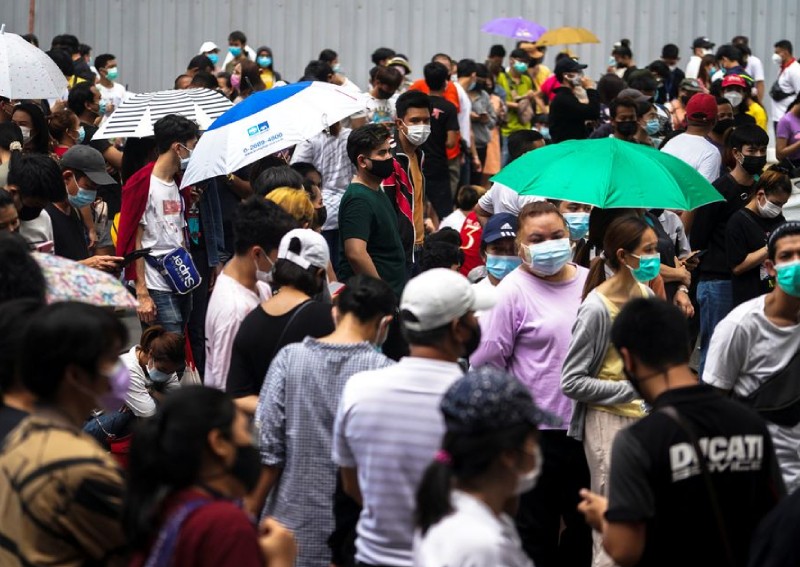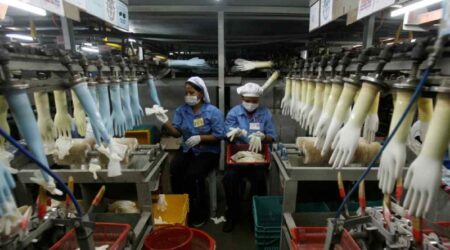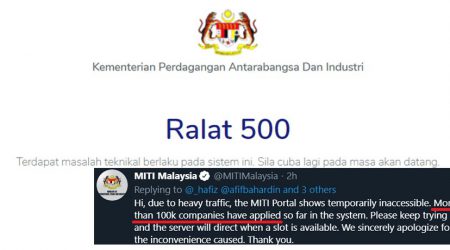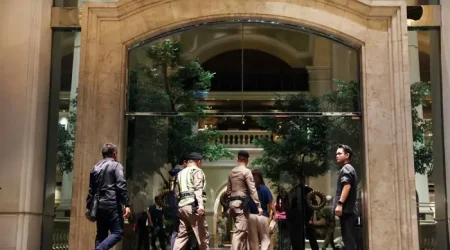Thailand’s rich Covid-19 patients get ‘hospitel’ treatment, as the poor are turned away

Reuters
In the lobby of Bangkok’s Pullman Grande hotel, medical teams clad in full-body protective gear shuttle back and forth, greeting well-heeled coronavirus patients as they arrive by ambulance for treatment.
About 250 rooms in the five-star hotel have been repurposed as a temporary extension of the capital’s Thonburi private hospital amid a rapid surge in new Covid-19 infections – with one-third of Thailand’s more than 45,000 total cases being reported this month alone.
In addition to field hospitals, at least 23 “hospitels” – a portmanteau of hotel and hospital – have opened in Bangkok in response to the surge, offering a form of luxury coronavirus quarantine for infected patients who exhibit little to no symptoms and do not have underlying health conditions.
Under Thailand’s universal health care system, coronavirus patients can receive treatment at a public hospital free of charge, but a stay at the Pullman Grande “hospitel” can cost up to 12,000 baht (S$509) per night, according to Nalin Vanasin, an executive committee member of the Thonburi Healthcare Group.
Part of the treatment fees can be covered by insurance or government subsidies, she said, adding that the group planned to add 500 beds at a three-star hotel for a reduced cost and expected to operate its Bangkok “hospitels for the next three months at least”.
Thailand’s policy of hospitalising all those who test positive for Covid-19, even those without symptoms, has prompted concern about its capacity in the event of a surge in the number of patients with severe symptoms.
Unlike Bangkok’s four field hospitals, whose 1,250-bed capacity was reportedly not enough to cope with the recent influx of Covid-19 patients, many of the city’s 4,900 “hospitel” beds are still available to book – with plans to increase capacity to 7,000 beds soon, according to the government.
A 14-day “hospitel” stay can cost as much as 400,000 baht, said one doctor who spoke on condition of anonymity. The average monthly wage in Bangkok is around 21,000 baht, National Statistical Office figures show.
“The government earlier promised free treatment for all,” said Wayo Assawarungruang, an opposition MP who oversees his Move Forward party’s public health policy. “However, I was informed by sources that private hospitals were never subsidised by the government.”
On Thai social media, complaints abound of coronavirus patients being turned away from public hospitals and failing to have their requests for treatment processed by the government’s Covid-19 call centre for days on end.
“I called everywhere, every day, many times a day about my treatment,” said Sophon Khantee, 25, who received his positive Covid-19 test result on April 9. “I finally got admitted on April 18.”
The user of popular Thai-language discussion forum Pantip added: “I have nowhere to turn now. The government said there was enough bed for everyone but it is in fact a different reality.”
Nattacha Boonchaiinsawat, another opposition MP from the Move Forward party, told of how he had helped a family of seven find treatment after five of their number were confirmed as infected at a hospital “but were told to go home because there were no beds available”.
“They tried calling the government hotlines and were told that the field hospitals were full. They were told to wait for further instructions,” he said.
Unable to observe proper social distancing at home, two further family members – a 60-year-old grandmother and seven-month-old baby – were also infected, Nattacha said.
The MP finally managed to secure beds for all of them at a public hospital on April 17 – three days after their initial diagnosis. “Is now the time for a serious discussion about changing the Covid treatment policy?” he asked.
Thailand’s health authorities on Tuesday sought to assure the public that there were sufficient hospital beds for the rising number of coronavirus patients.
Authorities reported 1,443 new coronavirus cases and four new deaths on Tuesday. The current wave includes the highly transmissible B.1.1.7 variant, which has been blamed for big jumps in infections in many countries, including the Philippines, where hospitals are struggling.
Of the more than 15,000 Thai cases this month, 223 have severe symptoms and 55 of those were using ventilators, said Taweesin Wisanuyothin, a spokesman for the government’s Covid-19 task force.
The health ministry has asked all hospitals to increase by 50 per cent or double their intensive care capacity to prepare for a possible rise in more severe cases. There are currently more than 9,000 hospital beds available nationwide, up from 7,000 last week, officials said.
Authorities are also drawing up a plan to allow patients with less serious symptoms to self-quarantine at home, but said this would not be implemented immediately.












Comment (1)
Why visitors still use to read news papers when in this technological world everything is
presented on net?